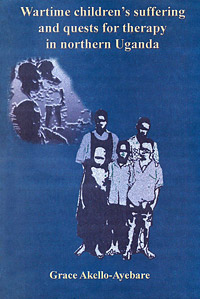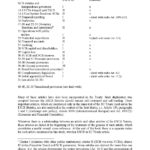Grace Akello ~ Wartime Children’s Suffering And Quests For Therapy In Northern Uganda
No Comments yet Prologue
Prologue
Ojok: An exemplary case of suffering and quests for well-being by wartime children in Gulu Municipality I will call this child Ojok (not his real name) to ensure anonymity. In 2004 when I met him, Ojok was a fifteen-year-old boy (1989) who was born in Kitgum four years after the beginning of the then twenty-year-old insurgency in northern Uganda. When telling his life history, he related how, whenever he asked his mother who his father was, he provoked anger, tears and fear. His mother, like a substantial number of women in northern Uganda, had been raped by a group of men in the rebel army. When she went to report the case to the state army, instead of being helped she was detained for weeks and subsequently raped frequently by a group of state soldiers. She managed to escape to one of the camps in the neighbouring Gulu district, but was already three-months pregnant with Ojok – a child-of-rape. Statistics are unavailable but it is well-known that as a consequence of any armed conflict, there are a substantial number of children with a similar life history. Ojok serves as an ‘archetypal case’. A substantial number of children such as Ojok were neglected till they died of malnourishment or abandoned in public hospitals and camps in Gulu. Ojok was lucky to survive till his age.
When Ojok was two years old, his mother got married to an ex-combatant with the Lords Resistance Army, who had escaped, and had settled in a camp in Gulu where she lived. In this marital union they had three children, aged 13, 9 and 7 years respectively in 2004. Although they were a relatively stable family, Ojok’s stepfather succumbed to HIV/AIDS when his youngest child was five years old. Before his death he had introduced his family to his patrilineal kin, but made it clear that Ojok did not belong to the family. According to Ojok, they had been living together in good peace with his stepfather’s kin even after his death. However, two years later, he also lost his mother to HIV/AIDS. Being the eldest in the family of four orphans, automatically Ojok assumed the responsibility of caring for his siblings, including providing for food, healthcare needs and where possible educational costs. He had to drop out of school in order to do leja leja (casual farm labour) and other income generating activities to meet all these expenses. One weekend in April 2004, he was summoned by his stepfather’s kin for a meeting. In this meeting he was told that he did not belong to the family and was subsequently ordered to vacate their land together with his siblings. To confirm their determination, the entire kinship group uprooted all the crops Ojok had on his farm and demolished the children’s house. Ojok together with his siblings left for Lacor night commuters’ home where they lived at the time of interviews in July 2004. He still worked at the hospital premises and other neighbouring places, but had a lot of medical complaints.
When Ojok was asked about his experiences in a one month recall he mentioned malaria, cough and diarrhoea. For malaria he bought chloroquine from a grocery shop for 100 Uganda shillings (approximately 0.043 euros), but for cough he and his siblings used mango and guava leaves. The nurse gave him some yellow tablets for diarrhoea. For his siblings, he bought chloroquine when they had malaria.
According to the night commuters’ shelter nurse where Ojok lived together with his family, “he is always taking Panadol for his headache, which never recovers”. Sometimes, the nurse gave him a higher Panadol dosage, say three instead of two tablets, but still he complained of headache. At night, Ojok presented another challenge to the people at the night commuters’ shelter. If he was not tossing around on his mat he was always having violent nightmares. Therefore, the nurse gave him a dose of Valium each evening. However, in the recent past, the nurse complained, “even if Ojok took five Valium tablets, they did not work! The administration was considering giving him oxazepams and perhaps other very strong tranquilizers”. Assessing Ojok holistically, it is clear that underlying his persistent complaints is a web of all sorts of social and psychological issues.
The main objective of this exemplary case is to show the complexity of the effects of armed conflict on children’s lives, including their illness experiences and quests for therapy. The content in Ojok’s story signifies a child facing uncertainty, having relatives dying of HIV/AIDS and the direct effects of the breakdown of social networks leading to complex healthcare issues in wartime. Ojok as I mentioned, is a synecdoche or archetypal case of a substantial number of children living in a situation of armed conflict. And for the armed conflict in northern Uganda which had lasted more than twenty years at the time of this study Ojok’s experiences could only be a tip of the iceberg of the magnitude of problems in conflict and post conflict northern Uganda which are intertwined with health and healthcare issues.
Download book: https://openaccess.leidenuniv.nl/ASC-075287668-2755-01.pdf
ISBN 978-90-5448-095-2 © Grace Akello, 2010 – African Studies Collection, vol. 25
You May Also Like
Comments
Leave a Reply







